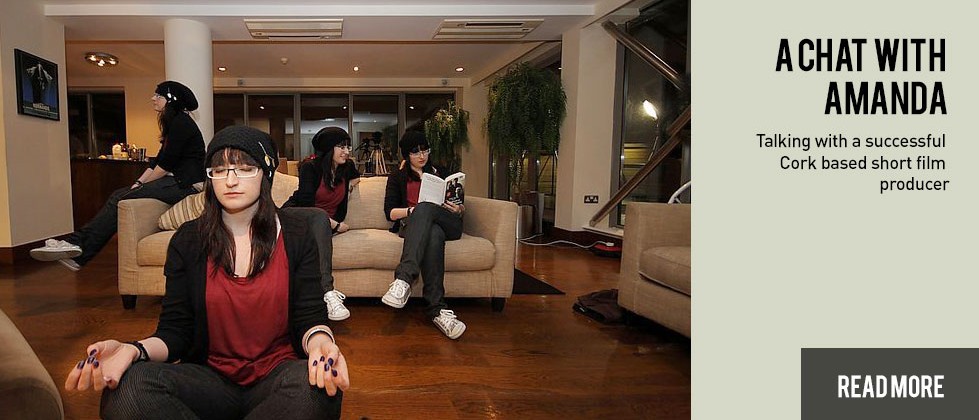
by SeanBreathnach | Nov 23, 2012 | Education, Producing
[image_frame style=”framed_shadow” align=”left”]http://egomotion.net/wp-content/uploads/2012/10/amanda1-179×300.jpg[/image_frame]
A Chat With A Cork Based Movie Producer
Amanda Ferriter began working in Theatre Production in 2004. She has worked as a Production/ Stage Manager with various companies including Cork Opera House), Guiness Jazz Festival, St Patricks Festival, Opera 2005, Yew Tree Theatre and Cork Midsummer Festival. In 2005, she working with the Scottish production company GridIron in the Edinburgh Fringe Festival. She recently stage managed a national tour of Verdant Productions ‘Guerilla Days in Ireland’. Amanda has also produced the award winning short films ‘Heart’ and ‘Partly Cloudy’ by Mark Cogan, ‘Gemma?’ by Kevin O Neill, ‘Mutt’ by Shaun O Connor. She was also co-producer of Liam Delahunty’s ‘Tom’s Sceadu’. Her current project is ‘The Nymph’ by Damian Byrne.
What is the best part of the job?
I honestly can’t pick one part of the job that I prefer over another! I love being on set and seeing what is on the page come to life, from the very first take to wrap its great watching the story unfold in front of you. Being the producer, most of your prep work is done so you have time to be on set and soak up the atmosphere! Another part I love is having the first public screening. Sure its nerve-racking not knowing how it will be received but ultimately people getting to see the short is one of the reasons why we make them. There’s no point in working hard for a project to sit on your computer for no one to see.
What is the worst part of the job?
The worst part for me is asking people to either work for free or at a reduced rate. There are so many talented people in the film industry in Cork but unfortunately there are not enough funding resources for everyone or for the amount of work being produced. Yes there are things like Fundit and kickstarter but it seems to me that the majority of projects are self-funded. I’d love to be able to pay everyone what they deserve, sometimes that’s just not possible. You do the best you can with your budget, but there can be times where you have to postpone the project and wait until you raise a bit more funding or you can scrap it… That’s never an option!
Leading up to a shoot – how much preparation do you do?
I would do a lot of the preparation leading up to a shoot, from finding locations, crew and sometimes cast (usually directors have some actors attached already or have people in mind for the roles) to organizing the schedules, logistics, catering, dealing with budgets, hiring equipment and arranging insurance. I’d liaise with each HOD to ensure that they have everything they need before getting to set. A lot of people say I’m crazy for liking the production side of the shoot but there’s a huge sense of satisfaction when you can make something come together.
[image_frame style=”framed_shadow” align=”left”]http://egomotion.net/wp-content/uploads/2012/11/IMG_7399-300×200.jpg[/image_frame]
What do you want from a Director? What is the ideal relationship?
Mutual trust and understanding. It’s so important to have that in the director/producer relationship. For a director, you are trusting someone to bring all the elements together. As a producer, you want to do the best you can so that what ends up on screen is what the director envisioned. Yeah there are times where you have disagreements where one person doesn’t want to budge on something, whether its a creative or budgetary issue, so you look at the bigger picture, find a compromise and do what’s best for the project. The Director and Producer want to create something that people will enjoy and they have to be on the same page for that to happen. They spend a lot of time together and talk numerous times a day in the lead up to a production so you have to get along on a friendship level too. I’ve worked with some really great Directors and I’m glad to call them my friends.
What was the biggest challenge regarding your most recent film?
The short film I’m currently producing (The Nymph by Damian Byrne) is proving to be the most challenging! It’s a night shoot with a few effects so making sure every detail is thought through carefully and planned properly is essential. We have an extremely small budget but its such a great story that it needs to be put on screen. We’re filming over 2 nights in an amazing location but if it rains, we’ve no choice but to postpone until early 2013. My main challenge on this however is having a tiny budget so we have to beg, borrow and steal in order to get it done. There are some amazingly talented people attached to it so as long as the rain holds off and I can put everything in place, I know something great is going to be created, despite the lack of a big budget!
[image_frame style=”framed_shadow” align=”right”]http://egomotion.net/wp-content/uploads/2012/10/amanda21.jpg[/image_frame]
At what point does the producer divorce themselves from a project?
For me, I’d take a step back once a project has been screened in a few festivals. After a film has been completed, I’d discuss with the Director what festivals to submit to. We’d work towards getting it screened in as many as possible, that can take longer than a year but once we feel that its had enough screenings, I think its time to put it up online for a wider audience to view it. With ‘Heart’, I wouldn’t let Mark put it online for at least a year and it was quite successful on the festival market but the online views have so far exceeded over 80,000, its far more than we could of hoped for and we are delighted with. You can stop working on a project but you never really divorce yourself fully as there’s always a sense of pride in something you’ve worked so hard on.
Who would you say your biggest inspirations are in the film world?
What inspired me to get into film was (and people may laugh at this reply but..) Lord of The Rings. I was in New Zealand in 2009 and went on a daylong tour of the filming locations around Wellington. It was really fascinating to see how they took a patch of green by a housing estate and turned it into the gardens of Isengard! I’ve always been a huge LODR fan ever since the movies came out and I used to watch the ‘making of’ more than the films themselves. When I got back to Cork, I started looking at my options and as film had always interested me, I decided to enrol in the St John’s film course. As for any favourite Producers or Directors, I don’t have any, as there are so many that I like. I don’t have a favourite genre either but I am fan of sci-fi and fantasy books and films and would love one day to be able to produce or be involved in making that genre of film here in the south of Ireland. Its great to have favourites but I like to be open to all films and genres.
What is your impression of the film industry in munster, and in particular in cork at present?
[image_frame style=”framed_shadow” align=”left”]http://egomotion.net/wp-content/uploads/2012/11/LIT_film_fest012.jpg[/image_frame]
The film industry in Cork is great at the moment! There are so many talented cast and crew producing amazing things. For a county that doesn’t have much funding available to us, the output of good quality work is incredible. I could list people but I’d be here for ages! There’s a great ‘can do’ attitude among everyone at the moment and a lovely camaraderie with people willing to help each other out too. I think its going to take another few years before we see big budget films frequenting the city and county but I hope it will get there eventually. The ‘important’ people are beginning to take notice of the talent and facilities available here and as long as we keep going as we’re going, its for our and future film makers benefit.
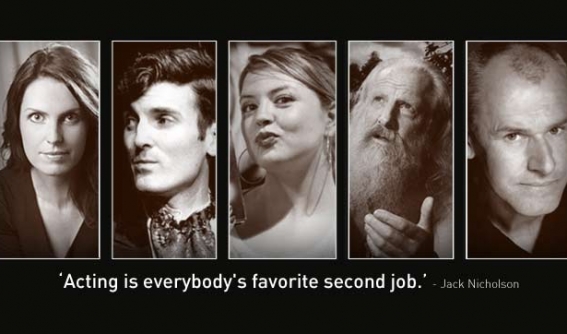
by SeanBreathnach | Aug 1, 2012 | Acting, Education, featured
A Conversation With Cork Based Actors
This week we interviewed some local actors to get their take on the short film scene, and to find out what makes them tick.
The actors we interviewed are:
[image_frame style=”framed_shadow” align=”left” height=”160″ width=”200″]http://egomotion.net/wp-content/uploads/2012/07/ruth-hayes-headshot-bw-medium-199×300.jpg[/image_frame]RUTH HAYES:
Ruth studied drama with LAMDA, here in Cork. She went on to study screen acting in both Cork and Dublin with the Irish Film Academy and with award winning writer and director Terry Mc Mahon. She has appeared in numerous performances on the Cork stage over the years, including Dancing at Lughnasa, The Country, A Serving of Pinter, Playboy of the Western World and Tons of Money. Her musical theatre credits include the lead characters in Guys and Dolls and My Fair Lady. On Screen, Ruth has featured in several short films including, Partly Cloudy, Th3 Room, Searching for Ten, Grief and Dying Wish. Ruth also played the lead character in the independent feature film The Far Road. http://osullivantheactorsagent.com/?p=396
[image_frame style=”framed_shadow” align=”right” height=”160″ width=”200″]http://egomotion.net/wp-content/uploads/2012/07/jrh.jpg[/image_frame]
JOHN RYAN HOWARD:
John graduated from Kinsale College and has also trained under Hollywood’s top Acting coach Margie Haber of Margie Haber Studios, Los Angeles. He has performed leading roles in over 50 Short Horror & Comedy films.
John’s work on stage has ranged from Irish classics such as Brian Friel’s ‘Translations’ whereby he played the leading role of ‘Owen’ to farce comedy’s such as ‘A Flea In Her Ear’ whereby he played the role of ‘Etienne'(a role made famous by Sir Anthony Hopkins).
John’s latest performance as ‘Lord Henry Wotton’ in a stage adaptation of Oscar Wilde’s ‘The Picture of Dorian Gray’ (July 2012) earned him critical acclaim.
http://www.imdb.com/name/nm3319585/
[image_frame style=”framed_shadow” align=”left” height=”160″ width=”200″]http://egomotion.net/wp-content/uploads/2012/07/CC-247×300.jpg[/image_frame]
CATHERINE CROWLEY:
When Catherine was growing up she wanted to be either an actress or a nun! Thus far the acting is winning that rivalry. If there is any aspect film-making, be it performing, sourcing props, clapper board, or even making the tea, there is nowhere she’d rather be. This is her passion.
Catherine studied acting in the School of Music and the Actors Space in Vic, Spain. She has been involved in several productions including ‘Baby Boots’ [dir. Dan O Connell], ‘Flipping Channels’ [dir. Fiona Riodan] and most recently ‘Partly Cloudy’ [dir.. Mark Cogan]
http://catherinecrowley.webs.com/
[image_frame style=”framed_shadow” align=”right” height=”160″ width=”200″]http://egomotion.net/wp-content/uploads/2012/08/534181_10150910420164219_1680869318_n.jpg[/image_frame]
FRANK HURLEY:
Frank Hurley starred in the lead role in the recent award winning short film “A Selfless Act”. Prior to this he has acted in several short films which have been screened in film festivals at home and abroad. Frank hHas also turned his hand to producing and has produced his last three films, ‘Baby Boots’ Twinkle Toes’ and ‘A Selfless Act’.
http://www.imdb.com/name/nm3810877/
[image_frame style=”framed_shadow” height=”160″ width=”200″]http://egomotion.net/wp-content/uploads/2012/07/SOC.jpg[/image_frame]STEPHEN O’CONNOR:
Stephen studied acting in The Gaiety School Of Acting and St John’s College, Cork after which he went on to act in over a dozen short films including The Lump (RTE / Ed Godsell) and The Legend Of Jonny King (Stormlight Productions). He has starred in Fair City and other RTE productions.
http://www.imdb.com/name/nm3734338/resume
The Interview:
1. What is the best part of the job?
Catherine: The best part to the job is meeting and working with people brimming with enthusiasm and talent. Being part of a friendly and passionate group also makes it not seem like work at all.
Ruth: I love getting to be someone else! I enjoy reading a script and discovering who the character is. Working out what makes them tick and how they respond to certain situations. Really getting under their skin. I’m obsessed with human behaviour, so the opportunity to play different characters in a disparity of situations is what I love most.
Stephen: Going home at the end of the day knowing that you did the best you could.
John: Personally, when you find a role that suits you perfectly where you have the opportunity of using your own unique qualities that colour a character uniquely. Particularly on stage where you have the opportunity of being in character for a long period in front of an audience playing a lead role where you really grow into a role organically. And not to mention the fantastic craic you have during a run of a show, mostly with an ensemble cast. Due to the long period of time you spend with a cast and crew on a show, everybody becomes very attached to each other in a good way.
Frank: I suppose I’ve lived in a fantasy land all my life, I think its fair to say I’m not in touch with reality at all, at all, and acting allows me to live out some of those fantasies briefly.
2. What is the worst part of the job?
John: The ruthless business side of acting. How hard it is to get seen whether it be on stage or screen, just to get Casting directors to watch any of your material or to come to a live performance. Most jobs in Cork or indeed Ireland are unpaid acting jobs so it makes it very hard to support yourself when you are committed full-time. Auditions also tend to be a horrible experience for most actors, particularly when you don’t get a fair opportunity to show your potential for the given audition due to a lack of understanding about acting or actors.
Catherine: I suppose the instability of the business. It’s always tough when your not sure when the next job is coming.
Stephen: Going home at the end of the day knowing that you didn’t do the best you could.
Frank: Getting nowhere fast!
Ruth: The uncertainty, for sure. It’s not the kind of job where you train and hone your craft and then opportunities will follow suit. You’re not afforded the luxury of that kind of career trajectory. You can have times when you’re constantly working, then times when you hit a dry spell. It really can be a feast or a famine. You need a lot of determination to stick at it in those quieter times.
3. What advice would you have for anyone who wants to get into acting for screen?
Catherine: Less is more. The camera picks up everything, it is totally different to acting on stage. The camera captures thoughts so the smallest glance will mean a lot. Keep going to acting classes/courses as you can always learn more. The day you stop learning is the day you die.
Frank: Don’t try doing it off the cuff like I am, go to drama school and do it the professional way.
Stephen: Take a screen acting course and act in as many student films as you can. Student films are a great way to gain experience.
Ruth: Firstly, I would advise on doing a course in screen acting. There are so many great courses and workshops in acting for camera. It’s a completely different discipline to theatre acting. Yes you’re still doing your scene breakdown and character study but the delivery is very different. A lot of these courses will show you how to deal with life on set etc. Many of them will record you acting on camera. Even though it can be a cringe worthy experience, it’s invaluable for highlighting little habits that you may have that you need to kick when acting for screen. Once you have that done, then go and get the experience. Send your CV into St. John’s central college here in Cork and put yourself forward for as many short films as you can. Keep an eye out online for opportunities also. Of course Egomotion is a great place to get to know people and find out what’s happening. Fellow actor Marcus Bale also runs the Irish bulletin for actors and actresses, on facebook, so make sure you join that too!
John: Get as good a showreel as you can get, ideally by finding duologues where you can be seen to be clearly working off another actor, actively listening, clearly in the moment with a substantial amount of reaction shots of you. As the saying goes acting is re-acting. And to have as good a contrast as you can both drama and comedy to show as much of a range as you can manage.
4. What was the biggest challenge you faced in your most recent film?
Stephen: Trying to remember that “LESS IS MORE”!
Catherine: Honestly, Heels. It can be hard working in costume for the whole day on set. Particularly if you haven’t broken them in beforehand!
Ruth: Falling forward on cue and making it look natural!!
Frank: The last film i did I played the part of a down and out. A real life homeless person approached me as if I was living rough and tried to give me some advice, I found it very hard to admit to this person I was only acting a scene so I stayed in character rather than embarrass him. There were also lots of times when people would throw me some money and it was also difficult to stay in character on those occasions so as I wouldn’t embarrass myself.
5. What advice would you have for movie directors when directing actors?
Ruth: I love to have an open dialogue with a director. I have always seen movie making as a collaborative process so I guess I’d advise a director to be open to suggestions by an actor and allow them the freedom to make choices in a scene. This is all within reason though and it’s important that the actor doesn’t go off on a tangent and veer from the essence of the character and the script. Good communication skills are vital here.
Frank: Give the actor direction! A lot of directors would leave it to your own interpretation, I personally think it would be easier for me if the director explained to the actor the story that was being played in his head but then, if I knew what to tell a director to do, then I’d be a director myself.
John: Be clear on what you want from the actor but trust the actor enough to do his/her job. Great directors, I think, give just enough guidance for you to fufill the requirements of a role without dictating the performance or restricting the actors’ own creative process.
Stephen: Listen to your actors before you shout “Action”.
Catherine: Everyone is different so it’s hard to say one thing that will work for everyone.
‘Communication is key’ – I know its a totally over used phrase but it is also very true. Be clear with how you want a scene to be, but be open and receptive to how the actor interpreted the script. This is why I personally think having rehearsals before going to set is a massive advantage. Also using storyboards in preproduction is quite helpful as you see what the director has envisaged and discuss it with them.
6. Who would you say are your biggest inspirations in the film world?
Frank: I’ve always admired the acting of Mel Gibson and Tom Hanks.
John: Al Pacino, Anthony Hopkins, Kevin Bacon, Colin Farrell, Gabriel Byrne.
Stephen: Gabriel Byrne and the late Donal McCann.
Catherine: Hard question as there are so many…
Males: Robert Di Nero, Al Pacino, Peter Ustinov, Dustin Hoffman.
Females: Maggie Smith, Meryl Streep, Michelle Pfeiffer, Sally Field.
Ruth: It’s really difficult to single anyone out. The people that inspire me are those who are not afraid to take risks, be it an actor, director or writer. Those who make the brave choices and see the job through. It’s tough to get projects made at times, so I have great admiration for those who have the vision and chutzpa to see a production come to fruition. Because we are such a small country, I always feel inspired and have a sense of pride when I see ‘our own’ doing well.
7. Are there any particular roles that you relish, or that you would love to get your teeth into?
Stephen: Dracula.
Frank: I’ve always fancied the idea of being a renegade soldier in a war movie but I’d also love to get into more comedic roles, so if there are any good directors out there with comedy war movies give me a shout.
Ruth: I’m delighted to say that I’ve played a good cross section of characters over the years. I’ve gone from drama to comedy to horror! However I’d love to get my teeth into a great action role. I’ve played the victim a lot so the chance to play a strong woman who can kick butt sounds like fun!
John: Well recently having played ‘Lord Henry’ in Oscar Wilde’s ‘The Picture of Dorian Gray’ directed by Cal Duggan for Kinsale Arts Week, I found it to be the role of a lifetime that suited my own unique quality of humour and found a substantial amount of personal parallels with the character that gave me a very specific avenue into the role and gave it 3 dimensions for me as a result. It was the best acting I’ve ever done as a result and those familiar with my work concurred. It just goes to show when you get THAT role that’s made for you.
Catherine: I want to do it all!! I never want to be typecast. However in saying that, villains appeal to me. When I was small I was always more fascinated with Maleficent and Ursula the Sea Witch than I was with Sleeping Beauty or Ariel. I love evil characters who are more fleshed out, relate able and fun.
8. What is your impression of the film industry in munster, and in particular in cork at present?
Catherine: I know it’s been said before in the other interviews on Egomotion but we can all feel a change at the moment. The Cork film scene is buzzing, gaining momentum and popularity. Our hope is that soon Cork will be one of the top spots for film companies to come and work in. We have hard working, talented people in Cork. We just need the funding so these people don’t have to move elsewhere to get steady work in our industry.
John: I think there is an incredible wealth of talent that has to break through at some stage, but something needs to happen for that to occur and I’m not so sure what that is yet.
Frank: Non existent.
Stephen: A sleeping Giant that is about to awake.
Ruth: Well there certainly is a buzz around Cork film making at the moment. It’s about time too. As part of this job I have to travel up to Dublin a lot. It’s nice to know that things are beginning to happen down here. There’s such a wealth of talent and experience amongst the film community here in Munster. What I love most about the community down here, is that people are extremely supportive of each other. There’s a sense of comradery and good will. We’ve all helped each other out in different projects over the years. Long may it continue to flourish.
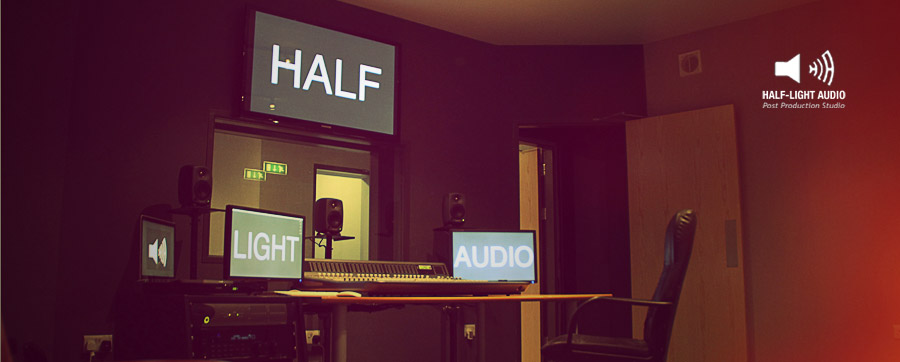
by SeanBreathnach | Jun 11, 2012 | Education
New sound studio opens in Munster
We interviewed Conor Barron of Half-Light Audio to find out about himself, his work and the sound studio he has opened in Cork city.
 Conor, tell us a little about yourself:
Conor, tell us a little about yourself:
Music and sound have always played a central role in my life, and at an early age I also developed a fascination with the technology involved. Like many people I played some instruments and began writing music and playing with bands around Cork, but it didn’t take me long to figure out that I had more of an interest in working behind the scenes. I began dividing my time between live sound engineering and recording demos for bands from a small studio in town. Eventually I went to study Music Technology in the University of Limerick which brought together the creative and technical elements of sound and music in a meaningful way. Not long after I got a job in Bristol, UK, working as a Creative for Apple Retail where I was exposed to the world of media production. I returned to Cork with a plan to build a sound studio and work in the audiovisual industry here.
What is your job description?
In my role as owner of Half-Light Audio I wear many hats. I look after the technical audio requirements of film projects such as sound editing and mixing, as well as composing and recording music for picture. Each project brings a unique set of challenges and I enjoy the problem solving elements of my work. I find that networking is also vitally important to my job. Getting out there and meeting others in the industry can be hugely rewarding and gives me a chance to escape the
confines of the studio for a while!
Can you tell us a little about how you got into movie audio, and your audio career so far?
While working in Bristol I had the good fortune to meet and work alongside some very talented folks working in the picture industry. I collaborated on a handful of projects and was bitten by the bug. Back home in Cork I advertised my services and was encouraged by the positive response I received.
Is there an area of sound/audio development that you’re particularly drawn to?
It’s hard to say really. I enjoy working with others and helping them bring their projects to the next level. In terms of individual sound and music tasks I take each stage as it comes and give each one the attention it deserves to achieve the overall goal. If you were to really pin me down I would say that I enjoy the pre-production stage because a blank canvas is one of the most terrifying/ exhilarating things in the world!
You also compose soundtracks. Can you tell us a bit about that?
Music for film is a strong passion of mine. Even though I’ve only been composing film scores for two years now it’s been a dream of mine for a long time. When I was young I remember turning down the volume on the television and playing guitar along to the picture. It’s a privilege to work with some of the fantastic film making talent here in Cork and to be trusted with scoring their films. I enjoy the collaborative element of film making and there is a true synergetic effect that can be achieved when a composer works closely with the director of a film in creating a soundtrack.
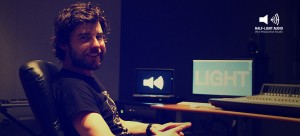
Have you particular advice to give amateur film makers regarding audio in their movies?
Plan ahead! Professional film makers will bring their location sound recordists along with them when scouting locations. The purpose of this is to spot any potential sound problems. Examples of this may be excess traffic noise in an outdoor location, noisy electrics in internal locations. Even if you don’t have a sound recordist these are things you can do yourself, all you need is a pair of ears! Most film makers will be slow to change a film’s location purely because of sound problems, but knowing where the potential pitfalls lie might make the difference between a horrific audio track and a useable one.
Have you an opinion on recording sound direct to camera?
If your only option is to record your audio directly to camera then I would recommend investing in a decent external microphone. Many cameras support a single external sound source for the simple reason that on-board microphones usually aren’t of the greatest quality. A single shotgun mic aimed directly at an actor will yield significantly better results than an on-board camera in the same position. Without getting too technical the shotgun mic can target a sound source from a distance (i.e. without being visible in the shot) whereas an on-board mic would have to be shoved up in front of the actor’s mouth to get the same results. Ultimately the benefit of a shotgun mic is a noticeable reduction in ambient noise on the soundtrack with more of a focus on dialog.
Do you think that sound in movies sometimes doesn’t get the respect it deserves?
I think that there are really two answers to that question. When a film is being shot, especially in lower budget productions, sound is often one of the last considerations to be made. This is usually to the detriment of the audio track. However, during screenings it suddenly jumps up and becomes one of the first things to be noticed. Film makers are generally very visual people and most of their focus when it comes to production is on the picture. If you feel that you fall into that
category then the two wisest investments you can make in regards to your soundtrack are an experienced location recordist and sound editor.
Are there any movies in particular that stick out in your mind as being notable for their use of sound?
I have a very short term memory for these kind of things, so instead I will say the most recent film I watched with great sound was Super 8. Sound design was done by the venerable Ben Burtt and the team at Skywalker Sound, and it is a masterclass in restraint and controlled excess. Chaotic explosions are interjected by uneasy silences which makes a refreshing change from the ‘wall of sound’ technique that would have been used by so many others.
What are the main creative / technical challenges you faced in achieving your vision? Do you find the same challenges cropping up on each of the movies you work on?
I think the truthful answer here is probably budget shortages. Many film makers have difficulty raising the finance needed to get their ideas from their heads and onto the screen. Lack of funding means that compromises are made along the way. In sound, for example, the full complement of audio production for a feature film might be location recording during shooting, and then during post production dialog editing, ADR, foley, sound design, sound effects editing and ultimately mixing. Short film projects that reach my desk usually have had a location recordist involved and that is an excellent starting point. With minimum budget you can really shine up those audio tracks in the edit, but if you are trying to get the ‘big sound’ achieved in commercial features then funding is a must.
Can you tell us a little about what you are currently working on?
Right now I am writing and recording the music score for Mark Cogan’s latest short film, ‘Partly Cloudy’. Mark and I worked together before on his previous short, ‘All Night Long’ which screened as part of the short film corner at Cannes 2012. Mark has a great talent for keeping the energy flowing in his films, something which only experience can teach you. This film score also sees the return to our studio of Holly McConnell on lead violin, accompanied by the Half-Light Quartet.
There seems to be a buzz building around film making in Cork. Have you found this to be true?
Absolutely. The past year alone has seen the launch of the Southern Screen Professionals, the Cork Screen Commission, two post production studios, and a wealth of talent continuing to grow their skills in the industry. Up until now film making in Cork has been fragmented, but now we are seeing more of a joined-up approach which is the foundation of sustainable growth in the region.
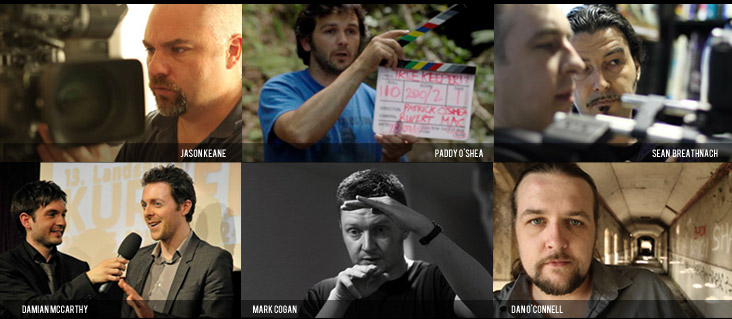
by SeanBreathnach | May 19, 2012 | Education, featured, Short film
We interviewed some local independent filmmakers to find out what drives them, what barriers they need to overcome, and what they think of the filmmaking buzz which is currently gripping Cork.
Click here to read the first part of the article
The Interview: Part 2
6. What advice would you have for anyone who wants to get into the movie making business?
Jason: Make sure you’re doing it for the right reasons! There will be many lean years before hopefully you will be able to make a successful living from it. The only thing that will sustain you during these years will be passion and love for the craft and medium. You really have to love it. In fact, it’s more like a vocation than a career.
Damian: If you can’t attend a film school then go along to film appreciation classes. Watch as many different films as you can. Write everyday. Put work into coming up with original ideas. Shoot something and learn how to edit it. There are loads of free tutorials online. Just start making short films. The first 5 or 6 will be really bad so don’t worry too much about them. I have never seen anybody made a good first short film. You just have to look at what worked and what didn’t and learn from it. I would also never abandon a film even if you know half way through the edit that it’s terrible. People helped you make it so the least you can do is finish it to the best possible standard.
Dan: Do it. It’s a blast. But don’t expect anything back, only what you put in.
7. What was the biggest challenge regarding your most recent film?
Seán: With ‘Searching For Ten’ it was probably locations. I had particular locations in mind that had character that fitted the story. I looked at a lot of locations all over Cork andWaterford. Here’s where a locations manager would have been a big help! In the end though, lots of people came through for us. Vibes and Scribes were great, as were CIT and O’Keeffes grocery at St Lukes, along with John and AJ Finn. The people here are enthusiastic about supporting local films.
Dan: It was definitely the edit. It’s a fractured timeline, so the possibilities are almost endless, the biggest problem is you get so wrapped up in the edit that you forget the big picture, you loose your understanding of the film. In some ways it was great having so much freedom to throw shots around wherever you want, but you see the same shot over and over. How do you tell the story if the words lose their meaning.
Jason: I’ve just started DP’ing a feature for someone so this is a real challenge. It’s my first feature so it’s a big step-up from shorts, corporates and live events. Things have started well so hopefully it will continue in that manner. Good preparation is so important. Exciting times ahead!
Damian: I’m in the very early stages of my first feature film now so the script is definitely the hardest thing I’ve ever done. I’ve written feature length scripts before but they were a mess. Mainly because I just launched into them with no real plan. I approached this script better though. I worked on plot for 6 months before even attempting to write a single page of the screenplay. I took a lot of dialogue notes too so when it came to the actual writing of the script it was easier. If you start writing a 90 page screenplay without a plan you’ll be lost by page 20. We have one short horror set-piece shot so far and I’m really happy with the footage, but this one scene has somehow resulted in more rewriting. I don’t mind so much as long as I’m replacing good ideas with better ideas, or making changes that are going to make the film more entertaining, but it would be nice to say ‘the script is finished’. Done. The story has always been the same it’s just how it’s being told changes. I think it was George Lucas said that ‘films are never finished they are abandoned’ – I’m starting to think this is also true of the script.
8. Would you recommend festivals or the internet for promoting short movies?
Mark: Festival screenings can be great. Some are quite prestigious and it’s always nice to be selected for a programme, especially in other countries. However these days I think having your film online is a far better option. The world is literally your audience and it has potential to be viewed by far more people than if it were screened at a dozen festivals.
Damian: Festivals first then the internet. Film festivals are great exposure. Good way of making contacts too. I usually wait until the films have played in a number of festivals before putting them up online as some festivals don’t want to screen something that’s available online. Once it’s played in a few places the internet is great for giving it a longer life. I’ve had festival programmers invite some of my films to screen at festivals having seen it online so having a film online doesn’t mean its festival run is over either.
Jason: Both. Festivals are a great way to sell yourself and meet other filmmakers. Once your film has done the festival circuit then it’s always a good idea to upload it to Youtube and/or Vimeo. Who knows who might get to see it!
Dan: I think both are good options. I tend to hold mine back from the internet in the hopes that one day I might actually send one out to a festival. Once it’s up online you kind of ruin your chances of getting into a lot of them, but then if you get your film online and get a million bejillion hits! Then that’s way cooler than getting into even the major festivals. If your film is any good then you want your film to be SEEN by as many people as possible, that’s the most important thing.
9. Who would you say your biggest inspirations are in the film world (directors, actors, cinematographers, etc)?
Patrick: I take inspiration from lots of different areas of film. I do have my favourite film makers whose work I would seek out every time they release something new. For example, Pedro Almodovar, The Coen Brothers, Darren Aronofsky, Quentin Tarantino to name but a few and I would also constantly watch and re-watch old classics and in particular the films of Stanley Kubrick.
I also find inspiration in an actor’s performance, Michael Fassbinder in ‘Hunger’ for example or Colin Firth in ‘The King’s Speech’ or Imelda Staunton in ‘Vera Drake’.
More recently I was very inspired by ‘Tinker, Tailor, Soldier, Spy’. It is such a well rounded, well made film. The writing, the directing, the beautiful camera work and production design and the amazing performances.
Jason: I have many favourite directors but it was especially the films of Akira Kurosawa and Stanley Kubrick that inspired me at a young age and opened up a whole new world of cinema to me.
Dan: That’s like putting a bowl of rice crispies in front of me and asking which one is the tastiest! I simply cannot say. Suffice it to say, that if I have seen their work in a cinema, on a DVD I bought or if I actively sought them out to watch online then they have achieved far more than I have yet and they are all inspiration to me.
Damian: I like actors and directors that take chances and do something different. Some of my favourite films are films that, when they’ve finished, you don’t really know what to make of it but there’s something about it that makes you want to watch it again. I think a lot of Stanley Kubrick’s films were like that for me. It took a second viewing to realize what he was doing and twenty views later you’re still discovering something new. I think he said ‘real is good interesting is better’. It sums up his films well, especially in the strange performances he gets from his actors.
10. Could you summarise how you recruit your primary cast and crew?
Dan: I held auditions for my last film as I was actively trying to find some new faces. A good friend of mine, Eoin hAnnracháin helped me a lot. He set up the auditions and found some great acting talent form all over the country. The crew, all of them, are great friends of mine. I help them out on their films, and they help me out on mine. The crew can change from film to film but that’s only because we are doing it for free and we have to work around peoples schedules. Sometimes people are not available and you have to work around that.
Damian: Enthusiasm over experience… within reason. I work with people I get along with. I read in some filmmaking book you shouldn’t make a film with anybody you wouldn’t go on holidays with. I wouldn’t go that far but maybe replace ‘going on holidays with’ for ‘a night in the pub’ and I think it’s sound advice. Making films are fun but the shoot can be tough and you need to have people there you trust and that you can ask for help if you get stuck. I know the director is supposed to know everything but it’s reassuring to know you can ask for a suggestion and then decide on what is best. The director gets all the credit at the end of the day anyway!
Jason: When I lived in New York, I would use Mandy.com, Craigslist and NYCastings to cast actors but since I returned to Cork I have relied mainly on Egomotion.net and FilmmakersNetwork.ie. Word-of-mouth is always important too of course.
11. What camera did you use to shoot your latest film, and why did you chose it?
Damian: I’ve made films on 8mm to 16mm to the 7D and I think it’s a balance of whatever suits the look of the film and with whatever your Cinematographer is most familiar with. It is important what you film on, but I think what you’re filming, as in, what is in front of the camera is more important. Is your location interesting? Is there texture on screen? Is the lighting right? Do you have unusual props? These are always more important to me than what piece of equipment we’re actually using. You could shoot some terrible unwatchable show like Fair City on the most beautiful grainy 35mm film stock in the world. Won’t make it any better.
Mark: We used a Canon 7D. The quality is superb and being able to change lenses really gives your film that professional cinematic look and takes it to the next level. I’ve shot my last three films on the 7D.
Dan: We shot using a canon 7D and a 5D mkII because they’re cheap-ish, we had access to them and they give great creative control over the image with nice large sensors and great availability of lenses.
Jason: The Canon 5D MarkII. It has its well-discussed limitations but if you’re aware of them, then you can work around them.
Patrick: We decided to shoot our debut feature film on a Canon EOS 5D Mark II. There was a number of reasons for choosing this camera. It has a full frame sensor and a beautiful filmic image when used correctly. It is a relatively affordable piece of kit for the quality of image that is achievable. The 5D is also very small and light and we were able to achieve very high and long crane and jib shots with the camera strip down to its basic shape. Also, because of its small size we were able to move around in small sets and locations and fit it into and onto moving vehicles.
Some drawbacks of the camera include rolling shutter, moire and aliasing issues and a limited dynamic range, but if you do enough camera tests and play to this camera’s strengths the results can be stunning.
Finally, what do you think of the film industry talent in cork and cork as a location for film?
Patrick: I think it’s a very exciting time in Cork as regards film-making. As a film industry Cork is very much in its infancy and I think what is needed now is for some Cork based film makers to make a couple of properly funded feature films in Cork. We have seen a good number of features coming to Cork to shoot over the past few years but they bring the majority of their key cast and crew with them. What we now need is films that are locally produced and properly funded.
I think Cork is a fantastic location for film. Stunning locations are available all over the city and county and there is a still a great local and community spirit that film makers can tap into.
Seán: There is a large pool of talent here in Cork from every discipline of movie making. It’s a great place to make movies. Everything is right here on our doorstep. We have a good sized city, and beautiful countryside. And there is a buzz around film in Cork at the moment. Hopefully we can see that buzz grow into a self sustaining industry.
Dan: This is the most exciting question; it really gets me charged up when I think about it. There is so much talent coming out of Cork at the moment it’s scary! You see the same ten or twelve faces popping up every year with some great films- it’s like a wave of filmmaking. Everyone seems to be working in tandem and everyone is getting better and better with each passing film. Some are going on to work on their features some are hot on their heels, but its all growing nicely. The future for Cork filmmaking is gonna be a whopper! Some one is going to break through the barrier and once they do the gates are open for everyone else. A rising tide floats all boats! Any other analogies?
Cork as location is pretty impressive: Lots of locations, lots of fresh untapped talent, infrastructure is there – all we need now is a decent sound stage!
Jason: When I returned to Cork after being away for nine years, I was amazed at how vibrant the independent film community was and how many talented and passionate people there were here. I really had no idea that Cork had such a thriving film community. I didn’t even know Cork had its own film school (St Johns)!
Cork really is a fantastic location for film and TV productions. Whatever type of environment you need – rural, mountains, pastoral, coastline, forests, urban, Cork has it all. I’m surprised that much more film and TV productions aren’t shot here. The only downside I suppose is the lack of adequate soundstage facilities.
Damian: There’s something special happening with filmmaking in Cork at the moment. Everyone is working on something. There are groups and pockets of people all working on something different. There are a number of filmmakers that are having their work screened not just locally too but in film festivals abroad. There are definitely a few people around that have great careers ahead of them. People seem to be quiet supportive of each other too. It’s obviously a competitive industry to get into but there’s a nice vibe around the Cork Film scene. You can see the quality improving every year in the Made in Cork section at the Corona Cork Film Festival. I’ve come out of a few of those screenings thinking ‘I need to work harder’.

by SeanBreathnach | May 2, 2012 | Education, featured, Short film
Part 1 of 2
We interviewed some local independent filmmakers to find out what drives them, what barriers they need to overcome, and what they think of the filmmaking buzz which is currently gripping Cork.
The people we interviewed were:
 MARK COGAN:
MARK COGAN:
Mark Cogan studied film and video production at St. John’s central College, Cork from 1997-1999. Since then he has written and directed numerous short films. Many of these have screened at film festivals internationally. These include Hitch Hiker, F.P.D., To all the ships at sea, So that’s the way it is, 65 and Heart. Heart was the recipient of the best screenplay award at the Underground Cinema awards in 2010. This was followed by All Night Long, a drama featuring Rosie O’ Regan and Sebastian Thommen . His upcoming short, Partly Cloudy will reunite the characters from Heart in a new story.
http://web.me.com/mizenman/Site/About_Me.html
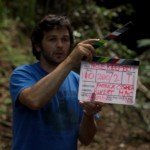 PATRICK O’SHEA:
PATRICK O’SHEA:
Patrick O’Shea studied Film in the Dublin Institute of Technology from 1995 to 1999. He was Head of Operations for Future TV Media Centre in Dublin for the year 2000, after which he moved to Luxembourg and worked in the film studios of Carousel Pictures and Deluxe Productions. From Luxembourg he returned to his home town of Cork City where he set up the production company Southernman Films. He has written and directed numerous short films, promo and music videos. ‘Tree Keeper’ is his feature directorial debut!
http://www.treekeepermovie.com
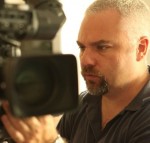 JASON KEANE:
JASON KEANE:
Born and raised in Cork, Jason Keane worked as a geologist and software engineer before moving to New York to study filmmaking. After graduating from the New York Film Academy, he worked as an assistant camera in New York before moving back to Ireland in 2009. He now works as a DP, camera operator and D.I.T., while also directing his own projects.
http://www.imdb.me/jasonkeane
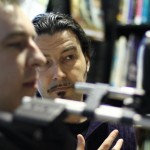 SEAN BREATHNACH:
SEAN BREATHNACH:
Sean Breathnach is an Irish film director, writer and editor. He graduated from NUIG in 1997 with a degree in Law and Economics. Since then he has directed more than a dozen short films and scripted several comedy shows, some of which were optioned in the UK. His films have been shown in film festivals world wide (Nevermore USA, New Jersey, Maine, Galway, Cork and more), some winning prizes on the way. His latest film, Searching For Ten, will be released this year.
http://www.seanbreathnach.com
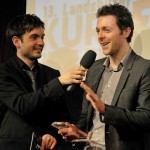 DAMIAN MC CARTHY:
DAMIAN MC CARTHY:
An award winning film maker from Cork, Damian’s films (including He Dies At The End, Hatch, Hungry Hickory, Never Ever Open It) have travelled to festivals worldwide. He is currently working on his debut feature film.
http://www.youtube.com/watch?v=MPYKigPU5RU

DAN O’CONNELL
is writer/director and the co-founder of egomotion, a Cork based filmmaking community and production company. His films range from documentary (Rock with your Cork Out, Letting Mr. Blue Sky In! – Flashmob) to drama (I Remember, Voices) but more recently he has focused on the horror genre. His previous film ‘Baby Boots’ featured in Cork Film Festival, Cannes – Court Metráge and Schull Fastnet Film Festival. Dan likes to surround himself with talent and learns more and more on each project big or small.
http://www.imdb.com/name/nm3810124/
The Interview: Part 1
1. What is the best part of the job?
Damian: Writing. First getting an idea and the process of fleshing it out into a story.
Jason: Power, glory, riches and the ladies! (sarcastic)
The process itself is great – working with other like-minded people to create something special. When the film is finally complete, be it your own film or one you’ve worked on, it’s great to be able to sit down with an audience and watch the finished product on a big screen.
Mark: For me the most rewarding part of the process is watching your idea come to life before your eyes. After it has only existed in your head for so long, it is a great experience to have life breathed into it by the actors and other talented people who help make it a reality. The sense of collaboration is terrific when all the right people are involved.
Seán: The diversity. I love the fact that I can spend some time alone, writing or coming up with ideas. Then I can collaborate with a talented crew to make the idea become more than the sum of its parts. You’re not sitting there doing the same thing day after day. And you get to work with some really great people. That moment when you declare your movie complete is very very satisfying.
Dan: The Money!
Seriously though, it’s probably when you get that idea, when something about it just makes you want to make the short. It’s a great motivator, coupled with the excitement that in a few months from now someone you don’t know is going to sit and watch it and hopefully pick up on that initial concept. And of course the craic, there’s a great atmosphere on set.
2. What is the worst part of the job?
Mark: Trying to get the project off the ground can often be a challenge. The frustrations and disappointments of trying to raise funds or pull many elements together can often kill any energy for the film. It’s very important to believe in what you’re doing and hope that your belief will inspire others to help you make it a reality.
Seán: The uncertainty and the search for finance. Both of those things are a real pain, and both are connected. It’s a tough deal finding funding for movies – shorts or feature length. There is no such thing as a no budget movie.
Jason: For me, definitely all the niggly organisational duties that a line-producer would normally perform. I need to hook-up with a talented producer!
Dan: I can’t think of one specific thing. There are little moments though, like that nagging feeling that everything is going to go wrong on set, or did we get that shot? Why the hell didn’t we get that shot! Of course one of the best parts is also one of the worst. The initial screening, the fear of rejection.
Damian: Rewriting. Once you have a decent draft done, and if you plan on directing it yourself, you have to really pay attention to what you’ve written and imagine yourself on the day directing these scenes. Where is the camera positioned? Is it clear what’s going on? What are the actors doing? If you can’t answer these questions then something’s wrong with the story and you need to get back into it and figure it out. Kill those darlings.
3. What are the chances of someone in the film industry here in Cork being able to earn a decent living at their craft? Do they need to travel?
Patrick: I think that depends on what their craft is. As a writer you can earn a decent living from anywhere as long as you have an internet connection and of course you are a decent writer! I don’t think it’s possible for a crew member, let’s say for example, a camera operator or a sound recordist to make a living in Cork alone working on films alone. This type of crew position isn’t in demand enough in Cork as there simply is not enough work to go around. Anybody I know making a living from these positions would generally have to jump around the country in order to make a living.
Personally speaking, as a writer/director I can’t earn a living in Cork on writing/directing films alone. I do, however, mix a number of crafts together and work in different areas to earn a living and still manage to mostly stay in and work in Cork. For example, while writing and developing fiction projects I will work as a writer/director/camera operator/editor on corporate and promotional projects and I also teach a film-making course for teenagers.
Damian: I don’t really think it matters where you live. If you’ve made an interesting, entertaining film it’ll travel. If you have enough stories in you, which you can tell with the locations available to you, then you probably wouldn’t feel the need to travel. I think if you wanted to make bigger films, action movies or something on a large scale and you were in a position to do that then you would have to go where larger productions are happenings. It all depends on the story you’re telling. Overall though I think they’re are much easier ways of making money than from filmmaking.
Dan: I’d say the chances are slim and none at the moment, you kind of have to love what you’re doing, but there does seem to be a certain momentum picking up here and I think the future for Cork is bright. You could do some corporate work (boring) or music videos to tide you over but really short film is a financially unrewarding industry. Lots of people seem to be moving towards the feature film now but even that is a lot of hard work to make a bob from unless you’re either extremely gifted or really lucky.
Jason: I’ll let you know in a year.
4. How do you go about getting attention for your work?
Jason: These days I think it is essential for every filmmaker to embrace social media. Whether you like it or not, it is a very necessary evil. Everyone should at least have Facebook, Twitter, Youtube and Vimeo accounts. Oh and of course a profile on IMDb too.
Damian: Enter film festivals and competitions. Come up with a strategy for the film. Research the festivals you’re entering. If you have a genre movie target the festivals of that genre first. Once the film has played in a few places and if it hasn’t been distributed, put it online and share it with whoever you think might watch it.
Dan: I must admit I’m rather lacking on that side of things, I send my stuff to local film festivals and an odd international one, but to be honest, it’s basically Facebook, and organizing a local screening of the film.
Seán: By making the best films you can possibly make. Then you take those films and you send them all over the world. And then, after some time, you put them up online. It’s one great advantage these days – you don’t have to wait around for someone else to distribute your movie. You can go ahead and do it yourself.
5. How difficult is it for film makers to finance their films? Is funding important?
Jason: Finding money for your films is always difficult, even more so now. It’s nice if you can get funding for your project, but if you can’t, it shouldn’t stop you from continuing anyway. Money also has a way of stifling creativity. Some of the most inventive and ingenious films ever made have been low budget productions. Necessity is the mother of invention.
Damian: If you need finance to bring the film to life the way you imagine it, then you should put the work into securing funding. If you know you can get it from your head onto the screen for very little money then why wait? It depends on how much time and effort you’re willing to put in.
I’m too impatient. I don’t think I could wait for someone to tell me whether or not I can make the film. By the time you’ve jumped through all the hoops and gotten a yes or no, you could have the film finished. There are too many stories I want to tell to be waiting around. I write scripts around locations I’m familiar with, special fx I can achieve, props I can find or make. This does of course mean you have to beg, borrow and steal and you also have to convince a crew that the film will be worth giving up their time for. I haven’t chased funding for any of my short films and I can’t see how it would have made a difference to how the film turned out or how well it’s done. They’ve all played in the film festivals alongside short films made for obscene amounts of money. They all play to the same audience.
Dan: Hmmm.
That’s kind of debatable. I guess I’m on the side of the love for the art, doing it on a zero budget is kind of what attracts me to it, I love to see how far I can push it without money, knowing that every one on set is doing it for the love of their art but what ends up happening is we spend way over the odds in hours labouring over our work and not getting paid. We’ve got bills! So a lot of the time it really slows down how much we can achieve within a given year. I would love to be able to spend a lot more time learning while doing and I suppose funding would be a great way to do that. But then, there are thousands of filmmakers all over the country trying to get funding for their films and only a few dozen awards, so if you were going to wait for funding before you did anything it would be some wait. Catch 22.












